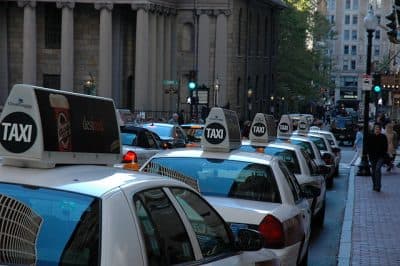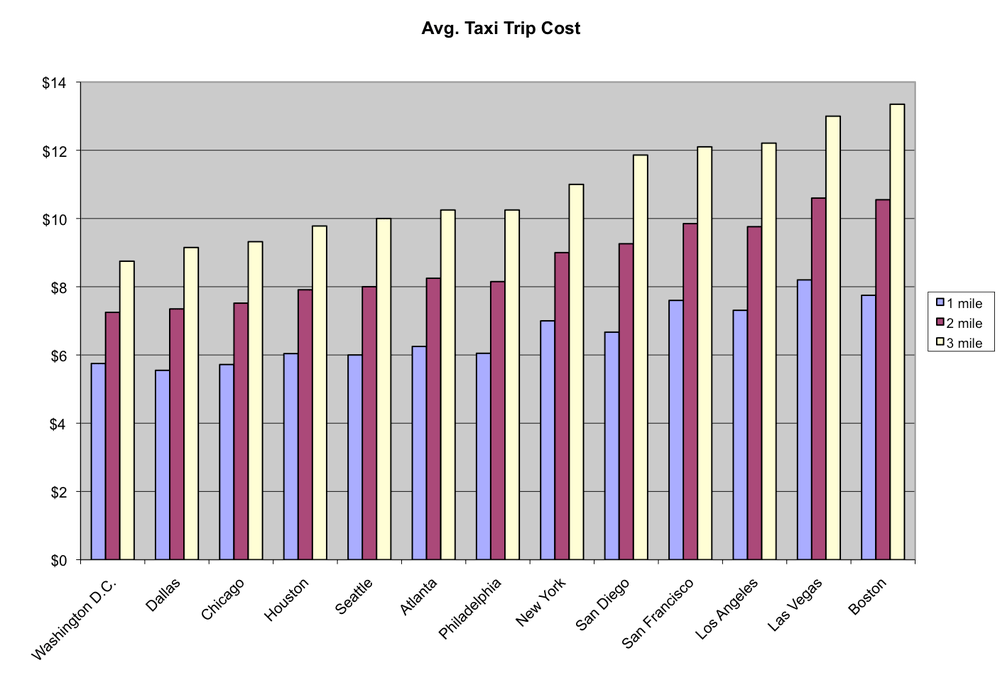Advertisement
Regulatory Hurdles Drive Up Cost Of Boston Cabs

If you've ever had the nagging suspicion that cab rides cost more in Boston than they do in other major cities, it turns out you're right.
Monday, we discovered that, for an average length trip, Boston has the highest fares of any big city in North America. A $13 ride in Boston will cost you only $9 in Washington, D.C. The question is, why?
Radio Boston's Adam Ragusea continues a two-part report on Boston cabs. We also speak with John Ford, co-owner of Top Cab/City Cab, and Sam Staley, the director of urban growth and land use policy for the Reason Foundation, about why Boston's fares are so high and why bringing them down is no easy task.
Guests:
- John Ford, co-owner, Top Cab/City Cab
- Sam Staley, director of urban growth and land use policy, Reason Foundation
The data in the chart below were provided by TaxiWiz.
Boston's regulation of the cab industry, particularly in the last two years, has been quite progressive. Or, aggressive, depending on your point of view.
"Boston, along with New York, and I know of no other city in America, requires that all taxis be brand new," said Mark Cohen, Boston's top cab regulator. "Now, this may seem like a little thing, but it's the difference between buying a car that might cost you $27,000 and one that costs you $2,000."
Certainly, that makes the taxi business more expensive. What else?
"We have required that every taxi have credit card machines in the back, and that technology — which is GPS, Web-based technology," Cohen said. "Those systems cost hundreds of thousands of dollars, if not millions, for our industry to put into place."
Advertisement
Plus, there's the 6 percent that the credit card companies take out of every fare for their processing fee. As much as cab drivers might complain about it, that cost was factored into the last rate hike that gave Boston the dubious distinction of having the highest per-mile fees of any big city in North America.
"Frankly, it's the consumer who pays for these situations," Cohen said.
But Boston is hardly the only city to place expensive requirements on its cab industry. New York City requires both credit cards and new cars, and yet, fares are cheaper. So again, what makes Boston so special?

Monday, I met a cab driver known as Tom "the Hack." He'd picked up a young woman at the airport who was on her way home to Malden Center.
Once we'd dropped her off, I asked Tom what he'd do next.
"Well, get back the shortest route to Boston, even though I'm going to have to drive back empty," Tom said.
Why empty? Well, Tom's cab has a Boston medallion on the back of it. While he can drop people off outside the city limits, he can't pick anybody up. At least, not a street hail. So, nine miles back to Boston we went, with an idle meter.
"Probably doesn't make a lot of sense as far as our green footprint, but I guess the Malden drivers got to make a living, too," Tom said.
This condition here is unique among major cities, as the high-traffic urban core is split between half a dozen municipalities, each with their own rules, their own regulators and their own cabbies.
"Does it kill you when you take someone to Harvard Square and then there's fares just dying to be had and you have to drive back over the river?" I asked Tom.
"Yeah, of course," Tom said. "But, you know, in general the Cambridge drivers run into that more in Boston. They drop someone off in Back Bay and they're on Boylston Street and everyone's waving. They know they're going back to a desert in Cambridge."
The need to travel through that desert is at the heart of Boston's taxi problem.
"Well, there's no question it's inefficient," said cab business expert Edward Rogoff of Baruch College in Manhattan. "There should be a regional transportation policy that covers this and allows driver to take fares where people wanna go."
"I think in the long run, unless the regulators get way out in front of this...I think you're going to see the medallion system eventually made obsolete by technology."
Prof. Edward Rogoff, Baruch College
Of course, not everyone agrees.
"I would find it highly ironic if a Boston taxi driver complained about not being able to pick up in the suburbs," Cohen, the Boston cab regulator, said. "The issue isn't so much that they can't pick up in the suburbs, it's that they fiercely want us to protect their borders and they don't want the suburban cabs picking up in the city."
For his part, Cohen would be happy to wave a magic wand, do away with the medallion system and maybe even unite Boston, Cambridge and Brookline in a regional taxi authority.
"But," Cohen said, "these are pipe dreams. When you have an industry that has rules that go back to 1931, to try to put the horse back in the barn on this thing is exceedingly difficult."
Difficult, but not impossible, says Prof. Rogoff.
"What's going to happen is that technology is going to make all of this obsolete," Rogoff said. "You're going to have an app on your smart phone, and you're going to say 'I want a cab,' and then a cab is going to show up."
If you arrange your ride in advance, the car that picks you up doesn't need a medallion. It could be a cab from a different city where the rates are cheaper, or it could be one of those livery cars you see everywhere these days.
"I think in the long run, unless the regulators get way out in front of this, which I think is unlikely, I think you're going to see the medallion system eventually made obsolete by technology," Rogoff said.
More:
- Radio Boston: Boston’s Cabs Are Most Expensive Anywhere
- Morning Edition: Ever Try To Use Credit In A Boston Cab?
This segment aired on February 15, 2011.